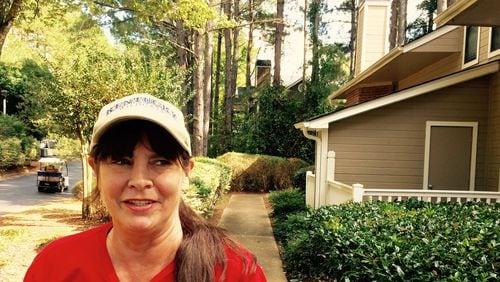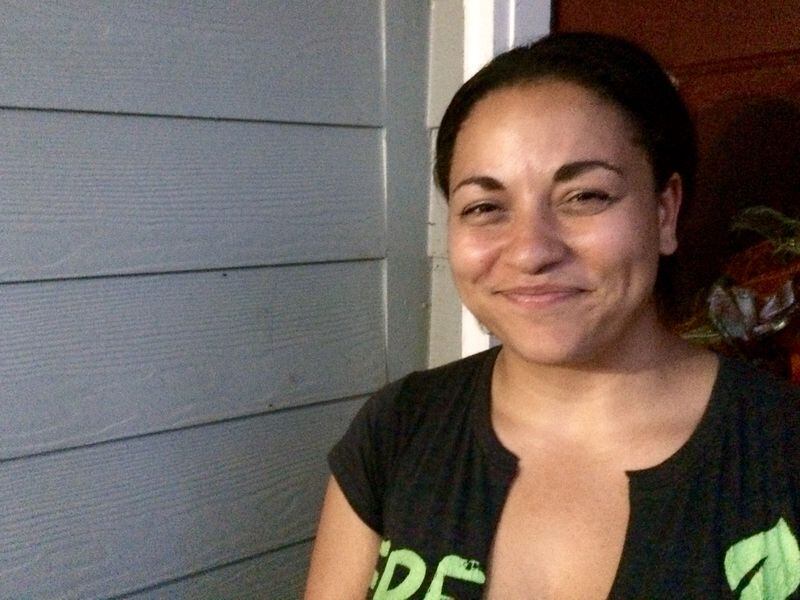She is worried.
The costs to live in the narrow townhouse already soak up half of what she takes home from working 60 hours a week at a chain restaurant, she said. “I’m not against working. And that’s a lot of work, but you can at least live on that.”
So far.
Moore is among about 187,000 households in metro Atlanta who live at the edge of disaster, using at least 50 percent of their pay to cover housing expenses, according to the Harvard Joint Center for Housing Studies.
The center considers those households "severely burdened," and they account for about a quarter of the renters in the region. In addition, another quarter of households are "moderately" burdened, paying more than 30 percent in rent.
VIDEO: More on this issue
Talk about gentrification has become common in discussions about home ownership. But a parallel process is occurring with rentals: higher prices put pressure on blue-collar households who must move or pay dangerously high shares of their incomes to stay.
"The lack of affordable housing is a major issue in every city I go to," said Denise Cleveland-Leggett, Atlanta-based regional administrator for the Department of Housing and Urban Development. "The market for affordable housing continues to shrink. Rents are continuing to go up and up. The more expensive apartments get, the harder people have to work to keep their heads above water."
HUD provides 56,000 vouchers in Georgia – more than half in metro Atlanta – to help pay for housing.
But the number of people being squeezed is far larger, even in an economy with low unemployment, plentiful jobs and solid growth. Since the end of the recession, rent increases have been outpacing wage growth, which means people with modest income must use more of their pay – or think about moving.
Renting over buying
Because it’s not just one apartment complex raising rents, it’s a metro-wide trend. Some may simply see the market justifying a higher rent for property they already own, others see investment opportunity.
"Landlords are buying older rental properties and renovating them because they can charge a lot more, anywhere from $50 to $300 a month," said Marjy Stagmeier, managing partner of TriStar LLC, an Atlanta company that buys and improves rundown property.
Her company charges below market rents, aiming for smaller short-term profits in exchange for more stability, she said. “By keeping rents affordable, we have fewer defaults and evictions and a high occupancy.”
But that is the exception.
The majority of rents are rising: the average rent is 6.9 percent higher than a year ago, according to ApartmentData.com.
The owners of Alicia Moore’s complex, the Atlantic Pacific Companies did not return a call requesting comment. But the forces pushing rents up are clear.
Start with strong demand: The flow of people into Atlanta has been steady. Many of the new residents have good-paying corporate jobs and disposable income. Additionally, there's a preference for renting among many millennials, as well as among some "empty-nest" boomers looking to downsize.
Moreover, the strong hikes in home prices makes renters of some people who might otherwise buy a house.
Developers have responded in recent years with construction of apartments and condos, but that has not helped low-income renters, said Mike Altman, chief investment officer of Atlanta-based Cortland, which operates in 12 states and has more than 50,000 apartment homes – including 10,690 units in Atlanta.
“New supply of apartments always enters the market at the top,” he said. “So the worst pressure on rents is at the top.”
Renters increasingly want to sign longer leases, partly to lock in rents, he said.
From the perspective of owners, the incentives to make improvements and raise rents are clear, he said. “Renovations need to occur over time. These are depreciating assets.”
Cortland has not been aggressive in exploiting the market, he said: The company’s average rent growth in Atlanta is $33 a month. “I don’t believe that represents an amount that would displace anybody.”
Atlanta's average rent is $1,349 a month, according to RENTCafé. That looks pretty affordable compared to Manhattan say, where rents average $4,119 a month, San Francisco with $3,590 or Boston's average of $3,379.
But renters here must pay Atlanta rent with Atlanta incomes.
Cascade of defaults
The lower tier of metro Atlanta rents averages $1,042 a month, according to Zillow. Someone who didn’t want to pay more than 30 percent of their paycheck for that rent would need after-tax income of $3,473 a month or about $42,000 a year.
About 671,000 households in metro Atlanta have annual income of less than $40,000, according to the most recent data from the Bureau of Labor Statistics.
“It has been 10 years since we’ve seen anything built that was coming into this group,” said Bruce McClenny, president of ApartmentData.com, a Houston-based research company. “Most were built before 1992.”
The result is ever-greater stress on renters.
That lower tier rent has climbed 6 percent in the past year and 17 percent since 2012, according to Zillow. In contrast, the median household income in Georgia is up about 7 percent in the past six years, but it's still not back to its pre-recession level of 2006.
The market’s rising tide is not a problem just for those blue-collar renters. It is also a potentially larger issue, since a bump in the economy could set off a cascade of defaults.
"These people are housing stressed, they are just one paycheck away from defaulting," said Aaron Goldman, president and co-owner of Perennial Properties, which develops and manages high-end urban apartments.
Goldman is also chairman of Open Doors, a non-profit group that tries to connect formerly homeless consumers in need of housing with landlords who have vacancies. Lower-income tenants are under increasing pressures, he said. "Rents have to increase just to keep up with rising real estate taxes. It gets harder and harder for people to find an affordable rent."
A painfully high rent is better than being homeless, though, said Yolanda Fleming, 32.
She and her kids have been homeless, so she is happy to have an apartment in Duluth, a ground floor, one-bedroom place with an entry around the back and she feels like she’s on the edge of losing it.
She works 25 hours a week in a cafeteria for $10.97 an hour. She wants to work more, but she needs to take care of her children when they get out of school.
She also gets a $750 disability check each month for one of her children, who has learning issues. The rent for her one-bedroom apartment in Duluth was just raised from $835 a month to $920.
Fleming has had some help making ends meet. Her utility bill – usually more than $100 a month, she said – has been picked up a few times by the Society of St. Vincent de Paul, a Catholic charity with a local conference at St Benedict's Catholic Church.
She still pays well over half of her income for rent, she said. “They don’t ask you what you can afford.”
And while many struggle, some at least have a plan for getting to higher ground.
Sasha Baylash, 31, lives in a ground level apartment in the back of a complex in Alpharetta where she pays about $1,300 a month. She shares custody of her two children with her ex-husband, who lives in the area.
She works full-time at an animal clinic where she makes $14 an hour – about $1,800 a month after taxes, which means she needed to add a second paycheck and cut corners to get by. She recently got a side job answering calls to a hotline for questions about pets and poison.
“This would allow me to keep my head above water,” she said.
Sometimes she gets food at North Fulton Charities. Sometimes she finds clothes for herself and children there. She's also had help from the Society of St. Vincent de Paul.
She is planning to get training to earn a license to be veterinary technician. It would mean more responsibilities and better pay. But it will take several years.
She saves money by foregoing a vehicle and walks to work, she said. “It’s about two miles, maybe a little less.”
However, that limits her options if the landlord were to raise the rent significantly.
“What I make is usually enough for the rent. If it goes up, then I’ll figure everything out,” she said. “They told me they would not raise it more than $50, but I’m already at $1,300. We shall see.”
Current median rents by tier, metro Atlanta
Lower third: $1,045
Middle third: $1,394
Top third: $2,129
Source: Zillow
Rent increase for lower third of Atlanta apartments
Past two years: 9.8 percent
Past three years: 11.4 percent
Past five years: 16.9 percent
Source: Zillow
Comparison, median two-bedroom rent
Atlanta: $1,190
U.S. average: $1,180
Source: Apartment List
Fastest growing metro rents over past year
Las Vegas: 6.6 percent
Orlando: 6.5 percent
Phoenix: 6.2 percent
Jacksonville: 5.7 percent
San Jose: 4.9 percent
Tampa: 4.9 percent
Riverside-San Bernardino: 4.7 percent
Salt Lake City: 4.5 percent
San Diego: 4.1 percent
Atlanta: 3.7 percent
Houston: 3.7 percent
Sacramento: 3.7 percent
Source: RealPage, Inc.
Average rent, of 252 U.S. cities
1. Manhattan: $4,119
2. San Francisco: $3,590
3. Boston: $3,379
4. San Mateo, CA: $3,234
5. Cambridge, MA: $3,112
6. Sunnyvale, CA: $2,926
7. Santa Clara, CA: $2,898
8. Jersey City: $2,894
9. Brooklyn: $2,801
10. San Jose: $2,735
….
93. Atlanta: $1,349
Source: RENTCafé
Georgia’s burdened renters: paying more than 30 percent of their income
Macon: 54.3 percent
Albany: 50.8 percent
Milledgeville: 50.8 percent
Bainbridge: 49.5 percent
Columbus: 49.4 percent
Valdosta: 48.8 percent
Cornelia: 48.4 percent
Toccoa: 48.4 percent
Athens: 48.3 percent
Atlanta: 46.7 percent
Sources: Harvard Joint Center for Housing Studies, US Census Bureau, 2016 American Community Survey.
Burdened renters, nationally: paying more than 30 percent of income
Miami: 61.2 percent
Los Angeles: 57.3 percent
New Orleans: 55.9 percent
San Diego: 55 percent
Orlando: 54.2 percent
Honolulu: 53.4 percent
Sacramento: 51.7 percent
New York: 51.4 percent
Las Vegas: 50.2 percent
Tampa: 50.2 percent
Chicago: 48.7 percent
Detroit: 48.7 percent
Boston: 47.3 percent
Austin: 47.1 percent
Houston: 47 percent
Atlanta: 46.7 percent
Sources: Harvard Joint Center for Housing Studies, US Census Bureau, 2016 American Community Survey.
About the Author








